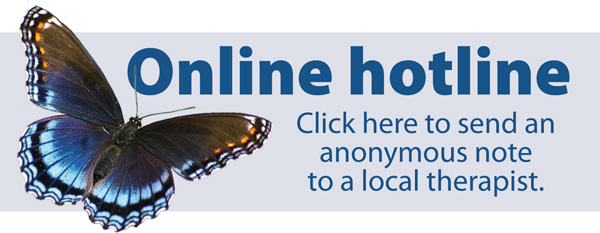I have been married for one year and I am a senior. My husband has called me a b-tch, has thrown clothes at me and has hit me in the back of my head while angry. If we argue in his truck, he slams on the brakes and tells me to get out of his truck. Recently he slammed on the brakes on the freeway. Thank God it was night time and there was almost no traffic. The other day, he called me fat and pushed me. I am fed up but I don’t know what to do. I have no place to go. I want a divorce. What should I do now?
Response by Libby Bier, MA, LPC, NCC, LADAC
Thanks for writing us and reaching out for help. First of all, you are brave and strong for making the decision to get out of an unhealthy marriage. Unfortunately, many people stay in unhealthy or violent relationships due to feeling of worthlessness, fear, or believing that they are deserving of the abuse. Several women and men I have worked with in similar situations to yours stay in the relationship because of not having the resources, (i.e. money, transportation, or housing) to leave, even though they feel it is necessary for their safety. Many women remain in unsafe relationships for fear of losing their children or that the abuse will only worsen if they try to leave. No one should experience physical, emotional, sexual, or other types of abuse and are deserving of loving and supportive relationships. Some may not realize that the relationship they are in is an abusive one. You describe many of the signs of an abusive relationship. Here are some examples of an abusive partner.
Possible Signs of Abusive Partner:
The partner:
 Embarrasses you
Embarrasses you- Calls you names
- Blames you for his/her problems or behaviors
- Has mood swings or is quick to get serious or overly sensitive
- Tries to control who you talk to or where you go
- Becomes violent or pressures you for sex
- Hits you, breaks things, or threatens violence
Domestic violence is far too common. Some studies indicate that nearly 20 people are abused every minute in the United States. That’s 10 million men and women every year! One out of three women, and 1 out of 4 men will experience some kind of physical or sexual abuse by a partner in their lifetime.
There are many other types of abuse or violence including rape, stalking, emotional abuse, and the trauma children experience from witnessing the abuse are just a few examples. It can be very challenging and even dangerous to leave an abusive relationship. As you, or other readers that are in similar situations, prepare to leave the abusive relationship, here are some things to consider.
When planning to leave a violent relationship:
 Consider talking to neighbors or family and ask them to call the police if they hear loud or concerning noises.
Consider talking to neighbors or family and ask them to call the police if they hear loud or concerning noises.- If there are children involved, teach them to call 9-1-1 or a trusted adult.
- Establish a personal bank account as you prepare to leave.
- Begin a mental checklist of things to bring with you (i.e. photo ID, money, birth certificate, marriage/divorce papers, insurance card, keys, medication, phone, special toys for children, special items you don’t want the abuser to take or destroy).
- And be prepared to just leave and not worry about any of these items if your life is at risk!
Leaving an abusive relationship can also come with additional issues to consider and develop a plan for. Sometimes family or mutual friendships may take sides and leave the victim isolated from a support network. Reaching out to those who are supportive will be important.
Women are also at increased danger of abuse or being killed once they make the decision to leave. The abuser may become more violent or attempt to find the victim to bring them home. Having a plan and being familiar with resources available in your area is essential.
It sounds as though you have already made the decision that you want a divorce and need to leave, but you just don’t know where to go. Many communities will have an emergency shelter for those leaving an abusive relationship. There are two wonderful resources in Northwest Arkansas who could offer you support. Northwest Arkansas Women’s Shelter is available 24/7 at 1-800-775-9011. Peace at Home Family Shelter is also available 24/7 at 1-877-442-9811. I strongly encourage you to call one of these shelters to speak to staff about safety planning for your specific situation.
Again, you are strong and courageous for your decision to leave the relationship. This choice can be easy and difficult at the same time because this is someone you do care for or once cared for. There can be negative impacts (such as mental and emotional issues) that persist long after the relationship ends. For some, part of the healing process includes seeking professional help to work through unhealthy thinking about yourself, your relationships, as well as any trauma you’ve experienced.
If you or others are in need of emotional or mental health support, the staff at Ozark Guidance would be happy to help. You can reach Ozark Guidance at 479-750-2020.
Therapists at Ozark Guidance would be happy to answer your questions and read what’s on your mind. Click the butterfly icon below to fill out an anonymous submission form with your question or concern. The form contains NO identifying information and is designed to give local women an online place to share concerns with a person qualified to offer feedback.
 Disclaimer: This RESPONSE does not provide medical advice It is intended for informational purposes only. It is not a substitute for professional medical advice, diagnosis or treatment. Never ignore professional medical advice in seeking treatment because of something you have read on nwaMotherlode or Ozark Guidance websites.
Disclaimer: This RESPONSE does not provide medical advice It is intended for informational purposes only. It is not a substitute for professional medical advice, diagnosis or treatment. Never ignore professional medical advice in seeking treatment because of something you have read on nwaMotherlode or Ozark Guidance websites.

